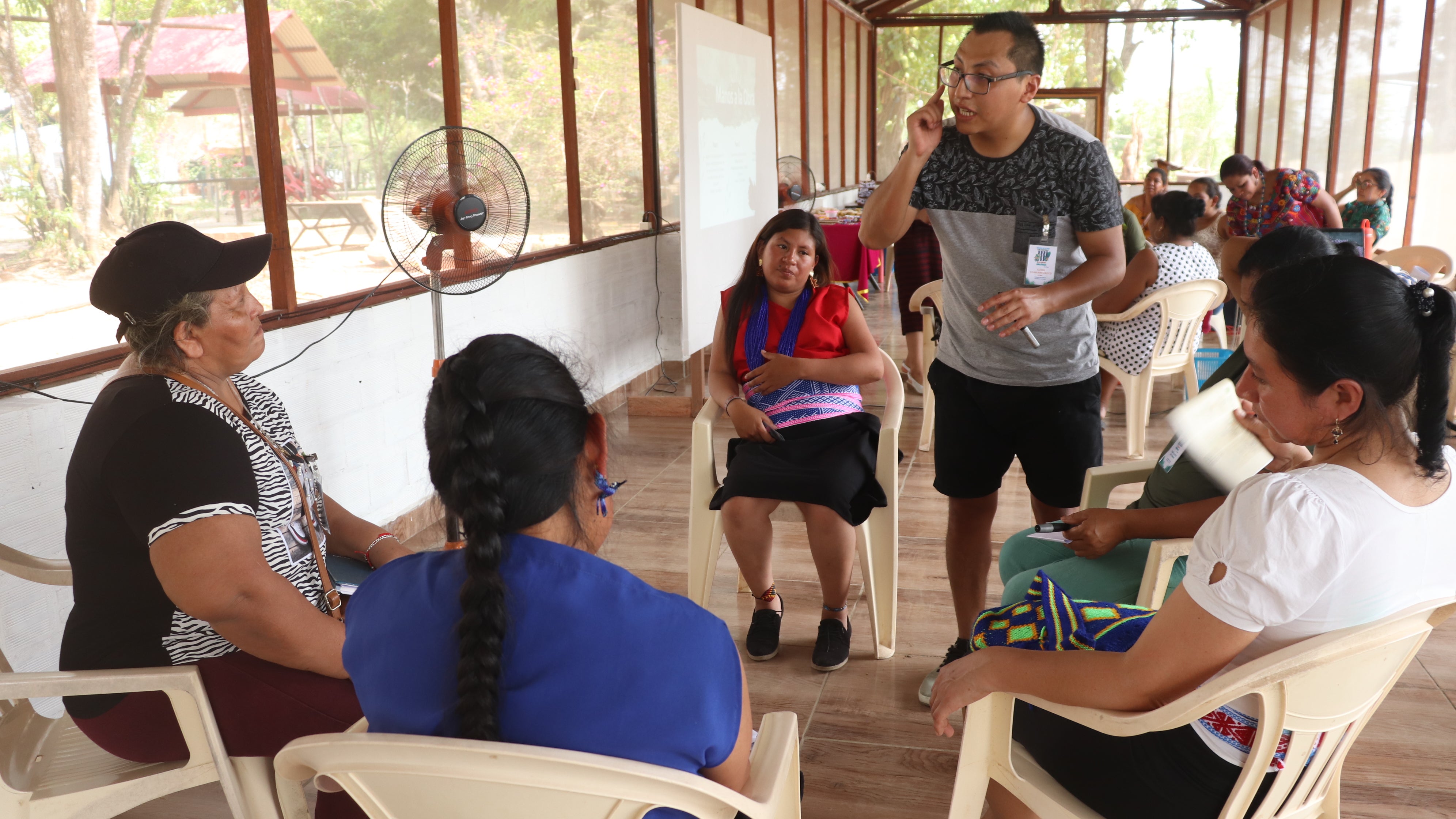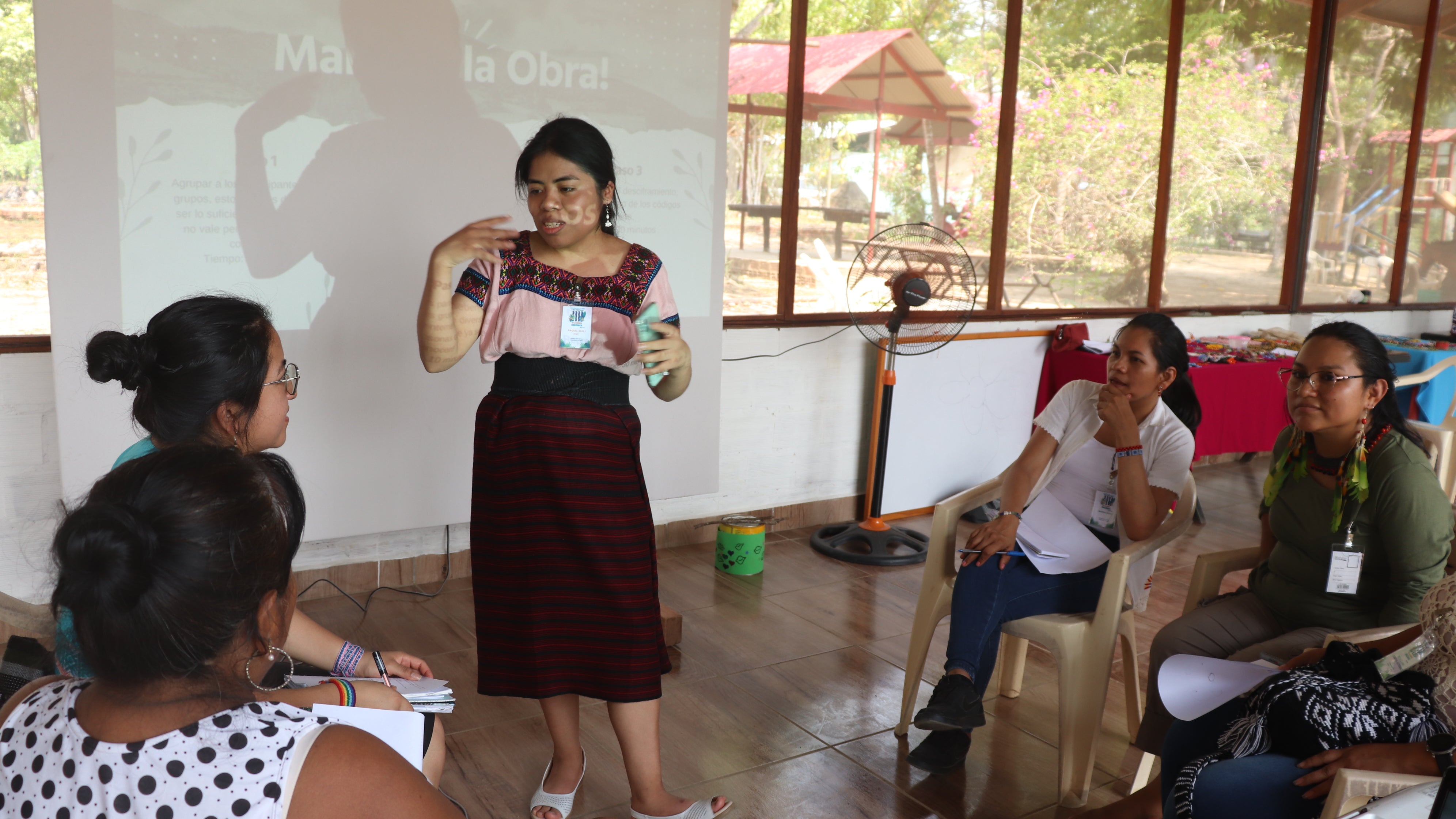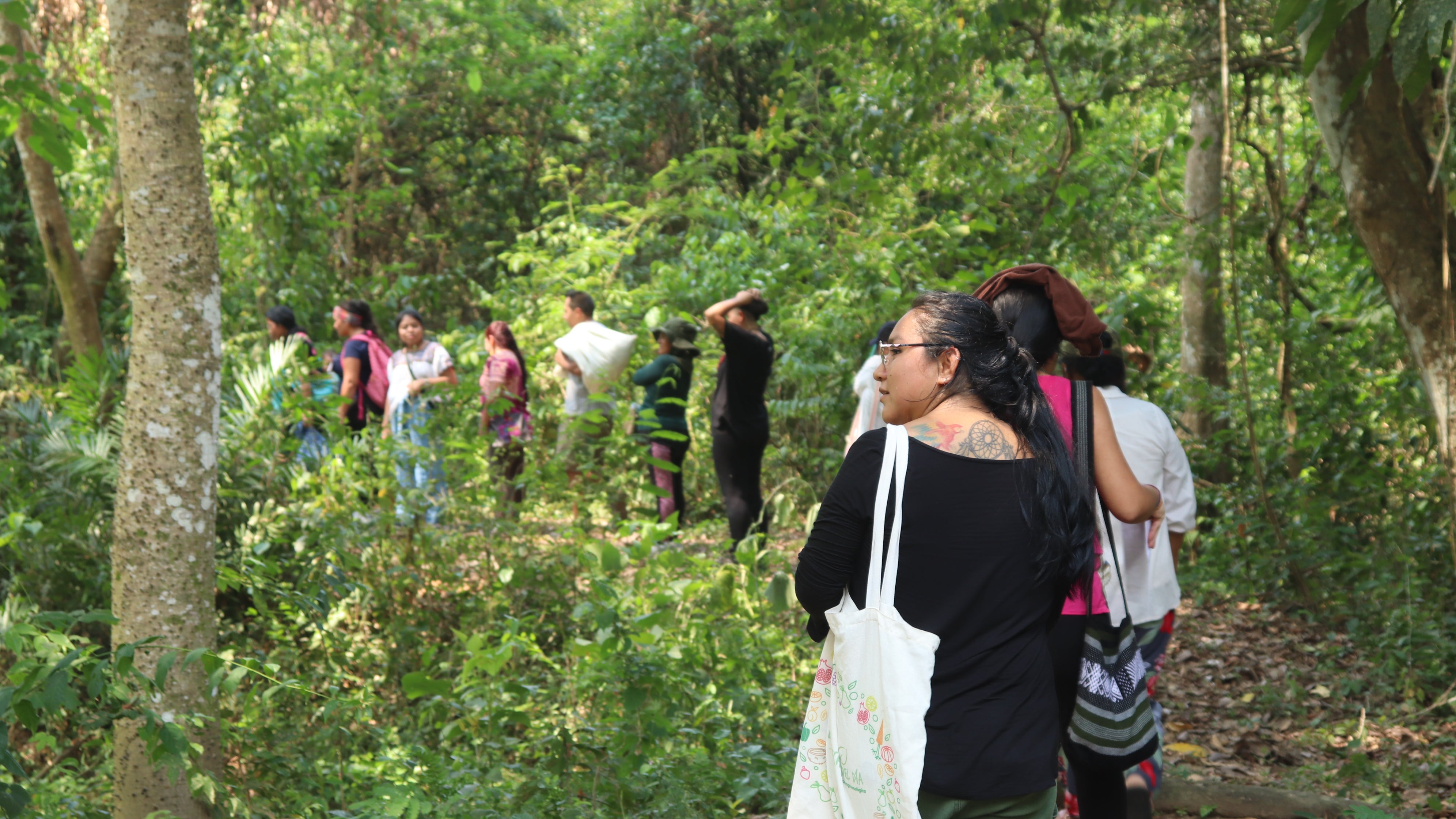Learning Together to Defend Mother Earth and Life
30 November 2023Diana

Diana Pastor (maya k’iche’), CS staff
A group of women dance and sing around the fire. The atmosphere is one of camaraderie and joy. In addition to singing and dancing, they play games, paint tattoos, and offer words of gratitude to the land and to themselves for having shared knowledge and experiences in recent days to continue to protect their territories. The feeling is one of bittersweetness, but also of satisfaction.
This joyous gathering took place on the penultimate night of the First Meeting of Women Defenders of the Amazon Basin, held in Trinidad, Beni, Bolivia from October 24-27, 2023. The exchange, organized by Cultural Survival, was attended by Inga, Kamëtsá-Inga, Cayubaba, Kichwa Amazonia, Guarayo, Amorua-Sikuani, Mugeño, Itonama, and Chiquitano women from Colombia, Ecuador, and Bolivia. Most participants had previously participated in a three-month online training project for Indigenous women defenders of the Amazon Basin, also organized by Cultural Survival. The objectives of this meeting were for the women, all leaders in their communities, to develop their skills in digital security and writing project proposals, and to exchange knowledge of community processes in defense of land and protection of life.
The adventure began when the women defenders traveled from their respective countries to Trinidad. Some of them were leaving their territory for the first time, while others had already participated in other spaces—but the nervousness and excitement of gathering was shared by all. The venue, Chuchini, an ecological center in Beni, Amazonas, allowed participants to meet and interact while surrounded by nature.
The first day focused on the women sharing their local experiences of territorial defense. The stories of organization and each of their struggles were a starting point for understanding how the processes that defenders carry out in their communities are different, but also share many elements in common. The participants were asked to organize themselves into groups to discuss some of the most pressing issues in their communities. They represented these through drawings, songs, and plays. The idea was to reflect on how their communities face threats to life and territory and how they confront these challenges in order to discover common strategies.

The representations of one of the groups reflected the bribery and manipulation of community leaders, but also organization, unity, community consensus, and consultation (or lack thereof) with Indigenous Peoples in the different territories, and how external threats affect the destruction of community life. As Rosa, one of the participants, said, “The lack of [available employment] causes the economy to fail, and corruption can enter.”
In the other groups, the themes represented were development and capitalism through extractive projects in the communities, the effects of these projects without the consent of the people, and how the protection of Mother Earth is vital for human survival. During their presentation, one of the groups noted, “What has happened in a community can identify solutions that can serve other communities.”
Strengthening capabilities in the area of digital security
On the second day of the meeting, the organization Internet Bolivia facilitated a workshop for defenders to strengthen their capacities on the issue of digital security. The objective was to learn about cyber and digital rights, as well as to clarify the myths and truths of the digital world. To do this, participants were asked to solve a puzzle about the process of sending and receiving a message. After the participants completed the exercise, they discussed how information passes through multiple channels, and that although there are laws that protect data in the respective countries, governments often make use of this information to manipulate their citizens or, in worse cases, to persecute them. That is why taking care of the information and using platforms that securely protect data, especially when defending human rights or the territory, is essential.

The topic of social networks and the control they can exert over user privacy was also addressed, as well as malicious or fraudulent websites that steal personal data and how to avoid falling for them. The workshop ended with sharing specific cases of violation of the privacy of defenders, such as the surreptitious use of active locations to track them.
Learning about drafting of project proposals
On the third day, a proposal writing workshop was held. Participants brainstormed project ideas and discussed their intentions to put into action via community initiatives. Some of the questions considered were, what do we want to achieve? What organizations support the community or address its problems? What elements should be taken into account when writing a proposal? Working groups were then organized to do a practical exercise where project proposals were presented. Participants were asked to choose the proposal that they would finance and to give the reasons for their selection.

The diversity of territories and the different levels of experience in preparing proposals allowed for a fruitful exchange among the participants, who, after the discussion, presented their choices. Project proposals on mining, rescue and conservation of traditional medicine, and attention to forest degradation, particularly the issue of forest fires, were the topics selected, reflecting the primary areas of interest and concern of the participants in their territories.
Finalizing the event and space to relax
Outside of the workshops, participants also spent their free time together. Given their multitude of roles as women and leaders in their families and communities, it was important to provide spaces of recreation and relaxation. One of the first exercises was a group meditation in the forest in which the participants sat around a tree and practiced some traditional mind liberation exercises guided by one of the participants.
Other activities included guided nature walks to learn more about the local environment. These were led by a guide from Chuchini, who interpreted the different animal and plant species in the area. The women, who were all knowledgeable about the Amazon, complemented the guide’s explanations by naming the animals and plants in their own languages.

On the last night, each participant contributed a gift from their heart, such as songs, music, words, or artwork, as a souvenir of the experience. On the final day of the meeting, materials and recognition were awarded by Cultural Survival, along with words of gratitude, encouragement, and inspiration from the participants to continue the fights rooted in and for their territories, and the hope of meeting again in the future.
Below are some of the participants’ impressions of the meeting:
“All of the topics have been very valuable, especially the defense of the territories and internet tips. The visit to places like the river walk and the museum were also nice.” –Nazareth Flores, Itonama, Bolivia.
“I was not part of the virtual course in 2022, but being in this space with the sisters has been very fruitful because I have gained knowledge about them that I did not know.” – Griselda Chavez Atoya, Cayubaba, Bolivia.
“Everything was very special. The topics that were taught were very clear, especially the experience of digital security, how to prepare your proposal for funds, and also sharing with the rest of the colleagues about our daily lives and struggles.” – Indira Vargas, Kichwa Amazónica, Ecuador.
“The meeting space allowed us to get to know each other from the critical problems in our territories and the traditions of our communities. Meeting each other allowed us to strengthen fabrics of trust and coexistence.” – Muskuy Tisoy, Inga, Colombia.
“What I felt when recognizing my sisters was a lot of emotion. We shared experiences, smiles, jokes, and also the problems in our territories that unite us to strengthen and support each other among nations. I would like to thank the team from Cultural Survival: great professionals, and above all, great human beings. Pay (thank you), Mother; pay, God.” – Luz Mila Jamioy Tisoy, Kamëtsá-Inga, Colombia.
All pictures by Cultural Survival
